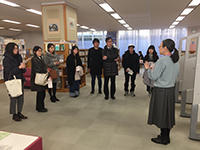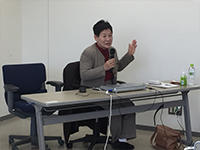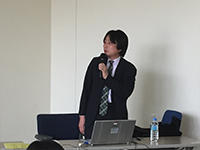Workshop on Dealing with Legal Counseling for Foreign Victims held at TUFS
February 28, 2018
On Thursday the 8th and Saturday the 10th of February, a ‘Workshop for Dealing with DV and Child Abuse in Legal Consultation’ (sponsored by the Center for Multilingual Multicultural Education and Research) aimed at Language & Culture Supporters* and TUFS students interested in interpreting was held at TUFS.
There are currently 2,380,000 foreigners living in Japan, a number which is rapidly increasing, and the necessity of training community interpreters in local governments and international associations is becoming imperative. The TUFS Language and Culture Supporters are receiving many interpretation service requests for law-related matters, and even within these requests there is much urgency, and specific knowledge of DV (domestic violence) injuries and child abuse cases is becoming a necessary for these interpreters, as is knowledge on the current law and support networks regarding such cases.
A total of 16 people participated in this workshop, at which they learnt about the support systems of public institutions for DV victims, the current situation of NGO support for foreign victims, and also learnt the definition of and laws surrounding DV from a practicing lawyer.
On the first day (Thursday the 8th), participants learnt about laws concerning DV victim support and the support system of Tokyo while looking at reference data. On the second day (Saturday the 10th), Nanae Ishii (Chief Director of the Fujimino International Cultural Exchange Center) gave a lecture on the current situation of support for foreigners living in Japan, and Attorney at Law Yuichi Sakashita (Saitama Bar Association) gave a lecture on laws regarding DV and child abuse cases.
*The Language & Culture Supporters are an organization made up of TUFS alumni, postgraduate students (including regular international students) and faculty.
Comments from Participants:
・I feel like I learnt a lot from having this chance to listen to talks from specialists. I have been involved with interpreting for rape and human trafficking victims, but even with this background knowledge, this workshop was a good reference for preparing oneself. If there is some way I can actively participate, I would love to get involved.
・In the talk from the Chief Director of the Fujimino International Cultural Exchange Center, I was able to hear a lot of details concerning current circumstances, which was very helpful. Comparisons with overseas support systems were also very informative. In Attorney at Law Yuichi Sakashita’s lecture, comments such as ‘depending on the local government, sometimes they will provide support that is outside the law‘ made me feel that some places are doing better than others. I want to always caution people that the problems faced by Japanese people are also faced by foreigners.
・I learnt that the Fujimino International Cultural Exchange Center has a shelter and carefully deals with supporting DV victims, which made me feel very reassured. I also learnt the basics and current state of laws and procedures concerning DV and divorce, and the things one must keep in mind when a case concerns a foreigner. As an interpreter, I felt that interpreting without too much or too little accuracy, and maintaining neutrality so the clients and victims can feel comfortable without developing a dependency on you, are very important parts of the job.
A Comment from Professor Minoru Naito (Institute of Global Studies, Community Interpreting Studies)
Through this workshop, I was able to comprehend the situation and importance of community interpreting regarding the problems surrounding DV victims along with the other participants. I also became aware that sometimes child abuse problems come ahead of DV victims, and on top of examining precautionary measures, I realized that it is important for higher education organizations to work together with specialist organizations.
  
|
